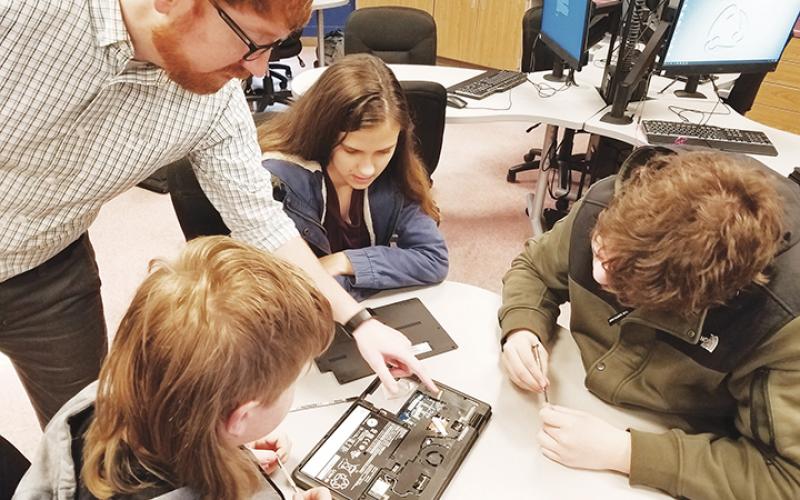Murphy - In February 2015, Cherokee County Schools started distributing about 1,800 Chromebooks – purchased with funds provided by Golden Leaf Foundation – to students in grades 6-12.
Today, students starting in third grade have their own device to use, thanks to a Digital Learning Initiative grant and other sources, while students in second grade are being introduced to working on them.
“They’ve become a part of everyone’s daily routine,” said John Parker, chief technology innovation officer for the school system.
The computers are used for assessments, allowing teachers to quickly measure what students have learned. Schools have access to OverDrive, a digital library that allows schools to share resources, like class sets of books. And with some devices, students can even take their notes using a stylus.
Plus, most state assessments are only accessed electronically, Parker said.
Overcoming obstacles
As the initial computers begins showing signs of age – five years is a safe estimate for the life of a device – the technology team has been refreshing student devices in grades 6 and 9. The $30 technology usage fee that families pay at the beginning of each school year – about $30-40,000 total – goes toward providing those new devices.
In order to get the initial $1 million in funds from Golden Leaf, Cherokee County Schools had to create a sustainability plan to show they could maintain Chromebooks availability after the foundation initial investment. The district uses a combination of those technology fees and state funds to support the program.
There have been some obstacles along the way. The technology team, with input from school principals, has adjusted what they do and purchase, and helped teachers adjust what they communicate to students.
The largest obstacle is when and how to use the computers to make up work when students miss school or school closes for weather emergencies and rural broadband issues, Parker said. Overall, the devices have benefited Cherokee County students by taking them out of rural confines and allowed them to “dream in a large way.”
“It leans heavily on the positive side,” he said. “It’s put our kids in a good position.”
Parker is especially pleased to see children getting the opportunity to explore on their own.
“They’ve got choices and voices,” he said.
Learning opportunities
It’s also created new learning opportunities. Not only have students been able to use the devices to create their code and participate in robotics competitions, but students in four schools are learning how to repair the devices.
At first, local resident Bill Grove helped with repairs, even showing the students basic repairs. Some students have become experts at certain repairs, and devices needing those repairs will be sent to their school.
Susanna Thompson, instructional technology facilitator, said the tinkering allows students to use problem-solving skills.
“It’s definitely a challenging new skillset,” she said.
At Murphy Middle School – the only middle school with students repairing devices – David Decker’s Computer Science Discoveries students learn how to repair the devices as part of their classwork.
“They get so excited when a Chromebook arrives to the SmartLab for repair, wanting to be the lucky student who gets to open it up and replace broken parts with functioning ones,” he said.
The most common repairs Decker’s students work on are screen replacements, keyboard replacements, palm rest assembly replacements and battery replacements. Last year, the tech repair teams at each of the four schools repaired more than 310 devices, saving the district $69,750 in replacement costs.
Students are even getting into the entrepreneurial aspects of device repair.
“They get hands-on experience in learning a real skill they can take with them when they walk out the door,” Decker said. “They can choose to make some pocket money with that skill repairing devices for their family and friends, they could potentially take the skills they learn doing these repairs and build on them by creating their own small business repair shop, or they can use these skills to save themselves money when they have a personal device fail on them.”
Students throughout the county are learning another huge skill – responsibility. Parker said they are trusting children with the devices, expecting them to take care of them. The younger students are actually more protective of their devices than the older kids.
“They treasure them more,” he said.

